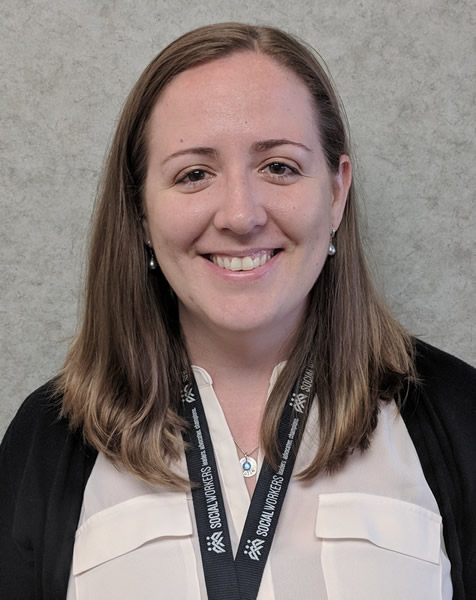Striving for Solutions
Social workers get you through tough times at any point during cancer care

Anyone who has been diagnosed with cancer or has a loved one with cancer understands the number of concerns it raises. Hearing “it’s cancer” brings forth big-picture worries about life and death, how to pay for treatment, telling family or friends and whether you’ll be healthy in the future. Then there are day-to-day concerns like how to get to treatment, coping with side effects and how to cook meals when you feel unwell. It’s a lot to deal with. Social workers understand and are here to help you get through it.
The clinical social work team at the Rogel Cancer Center has members in every area to help patients with every type of cancer. Despite the myth that social workers exist for the most extreme problems and situations, the truth is that no problem is too big or too small. If something is keeping your attention away from treatment and getting well, social work can work to find a solution.
We sat down with Becca Squires, LMSW, who works with gynecological cancer and hematology/oncology patients, to talk about the wide range of assistance the clinical social work team can offer.
Q: What is the role of a social worker on a cancer patient’s care team?
Our clinical social work team is embedded in the Rogel Cancer Center teams to assess, intervene and support patients and their families who have psychosocial concerns impacting their care. This means we can help with anything that is bothering or worrying them that might be preventing them from getting the best care possible
Because we are built right into the cancer care teams, we can meet with patients in the clinic during their visits, as well as provide support via phone.
Q: Aren’t social workers only for people with extreme circumstances?
No, that’s a myth. We are available for ALL patients and families of the Rogel Cancer Center, regardless of their disease, socioeconomic status or any other factors that contribute to coping with the diagnosis and treatment of cancer.
There is no way to rate any patient’s concerns as too big or small. Every concern carries equal weight. Our job is to help find solutions.
Q: What kinds of concerns can social workers help with?
Clinical social workers are available to help at any point in the patient’s care, including at the time of diagnosis, during treatment and at the end of care. Completion of care often looks different for each patient, whether it means returning to school or work, transitioning out of being in active cancer treatment or preparing for end of life.

Some of the issues we commonly assess and provide support for include patient and family concerns, depression and anxiety, home safety concerns, crisis intervention if a patient is really struggling, advanced care planning and durable power of attorney, which involves assigning someone to make your health care decisions if you are unable to do it.
Since many patients come to the Rogel Cancer Center who don’t live in the immediate area, the clinical social work team often assesses patients and helps them find support close to where they live.
Q: How do patients connect with a social worker?
Patients can contact their social worker directly or, if they’re not sure, they can request a referral from any member of their oncology care team. This includes their physician, surgeon, nurse practitioner, physician’s assistant, nurse or patient navigator.
Sometimes we get referrals for patients who are admitted to the hospital, requesting we see them in clinic after they are discharged.
Q: What are some of the common concerns you hear from your patients?
I see many patients and families who struggle to adjust after getting diagnosed. It is not an easy time. I also counsel patients dealing with the stress of the disease, which can lead to anxiety and depression. Some patients don’t have large support systems, such as family members or a nearby network of friends, so I can connect them with resources to help. Finally, I frequently help patients making decisions about their health care wishes. Not everyone knows terms like durable power of attorney or advanced directive. It’s my job to explain the legal language in a way that makes sense.
Q: What is the most rewarding part of being a social worker?
Medicine and cancer care is very solution focused: treat the cancer, minimize any side effects, focus on a patient’s quality of life and comfort. As social workers, we are trained as problem solvers who think outside of the box. The most fulfilling part of my work is when patients thank me for listening. They are so grateful that I heard their experience, both the joy and the sorrow, and helped them through it. For me, it is a privilege to hear each patient’s story and play a small part in their journey.
Q: What do you want to tell patients about social workers?
Social workers can be a valuable and supportive part of your treatment team. We can be utilized for many different means of support. Some patients benefit from a one-time contact and assessment with a social worker, but many continue with ongoing counseling during their treatment and even after. If you’re having any issues related to your diagnosis or care, we can help.
Continue reading the Fall, 2018 issue of Thrive
